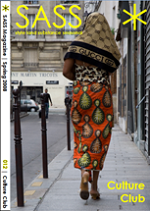| SSFtags: home | guidelines | list |
| Original Tag Date: 2007 Renewed: 2008 Type: Small Company Level: Company Website: moralfervor.com |
SUMMARY
Moral Fervor strives to create an ecological model of business through their clothing. Conceived in a tiny dormitory on the campus of Tyler School of Art in 1998, Emily Santamore and Melissa Sack discovered that they had far more in common than just their cramped quarters – they both shared a passion for art, fashion and environmental issues. United by artistic studies in graphics, printing, painting and art history, the two developed a close friendship. This relationship served as a catalyst and the foundation for what would become Moral Fervor. The company uses only bio-based fabrics that are organic and sustainable. They are conscientious about every level of their business - from the concept of each collection, design, sourcing and production. Each collection is inspired by an environmental or social topic, giving each collection a level of depth and meaning that they feel is an important part of life. The designers hope that the message behind the designs will inspire and educate. Constantly looking for ways to intertwine environmentalism and fashion, in 2005 Moral Fervor began incorporating Ingeo™ Fibers into their designs. Derived from fermented corn, Ingeo™ is the world’s first sustainable synthetic fabric. For their spring 2007 line, Moral Fervor became the first fashion company to exclusively use Ingeo™ fabrics. Moral Fervor’s fall 2007 collection incorporated fabrics like bamboo, Modal™ and organic fleece. Their pioneering approach to fashion technology has put them at the forefront of a full movement, already landing them in publications such as...Newsweek, Women’s Wear Daily and The New York Times, and has positioned them at the cusp of a growing sustainable fashion movement.
EVALUATION
human rights &
|
    
|
environment |
    
|
other business
|
    
|
COMPANY ATTRIBUTES
| human rights & social compliance | environment | other business practices |
|
|
|
Not Applicable
|














 has product(s) with Industry certification (e.g. SA 8000, Oxfam, Fair Labor, etc.)
has product(s) with Industry certification (e.g. SA 8000, Oxfam, Fair Labor, etc.) has active, enforced code of conduct, including global monitoring of human rights and labor conditions
has active, enforced code of conduct, including global monitoring of human rights and labor conditions respects the rights and cultures of indigenous people
respects the rights and cultures of indigenous people